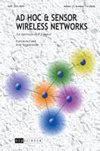Artificial Neural Network Performance Evaluation for a Hybrid Power Domain Orthogonal / Non-Orthogonal Multiple Access (OMA / NOMA) System
IF 0.6
4区 计算机科学
Q4 COMPUTER SCIENCE, INFORMATION SYSTEMS
引用次数: 2
Abstract
Next-generation wireless technologies face considerable challenges in terms of providing the required latency and connectivity for new heterogeneous mobile networks. Driven by these problems, this study focuses on increasing user connectivity together with system throughput. For doing so, we propose and evaluate a hybrid machine learning-driven orthogonal/non-orthogonal multiple access (OMA/NOMA) system. In this work, we use an artificial neural network (ANN) to assign an OMA or NOMA access method to each user equipment (UE). As part of this research we also evaluate the accuracy and training time of the three most relevant learning algorithms of ANN (L-M, BFGS, and OSS). The main objective is to increase the sum-rate of the mobile network in the introduced beamforming and mmWave channel environment. Simulation results show up to a $20%$ sum-rate average performance increase of the system using the ANN management in contrast to a random non-ANN managed system. The Leveberg-Marquard (L-M) training algorithm is the best overall algorithm for this proposed application as presents the highest accuracy of around $77%$ despite 37 minutes of training and lower accuracy of $73%$ with approximately 28 seconds of training time.混合功率域正交/非正交多址(OMA / NOMA)系统的人工神经网络性能评价
下一代无线技术在为新的异构移动网络提供所需的延迟和连接方面面临着相当大的挑战。在这些问题的驱动下,本研究的重点是提高用户连接性和系统吞吐量。为此,我们提出并评估了一种混合机器学习驱动的正交/非正交多址(OMA/NOMA)系统。在这项工作中,我们使用人工神经网络(ANN)为每个用户设备(UE)分配OMA或NOMA访问方法。作为本研究的一部分,我们还评估了三种最相关的人工神经网络学习算法(L-M, BFGS和OSS)的准确性和训练时间。主要目标是在引入的波束形成和毫米波信道环境中提高移动网络的和速率。仿真结果表明,与随机的非人工神经网络管理系统相比,使用人工神经网络管理的系统的平均性能提高了20%。Leveberg-Marquard (L-M)训练算法是该应用程序的最佳整体算法,尽管训练时间为37分钟,但准确率最高,约为77%;训练时间约为28秒,准确率较低,为73%。
本文章由计算机程序翻译,如有差异,请以英文原文为准。
求助全文
约1分钟内获得全文
求助全文
来源期刊

Ad Hoc & Sensor Wireless Networks
工程技术-电信学
CiteScore
2.00
自引率
44.40%
发文量
0
审稿时长
8 months
期刊介绍:
Ad Hoc & Sensor Wireless Networks seeks to provide an opportunity for researchers from computer science, engineering and mathematical backgrounds to disseminate and exchange knowledge in the rapidly emerging field of ad hoc and sensor wireless networks. It will comprehensively cover physical, data-link, network and transport layers, as well as application, security, simulation and power management issues in sensor, local area, satellite, vehicular, personal, and mobile ad hoc networks.
 求助内容:
求助内容: 应助结果提醒方式:
应助结果提醒方式:


